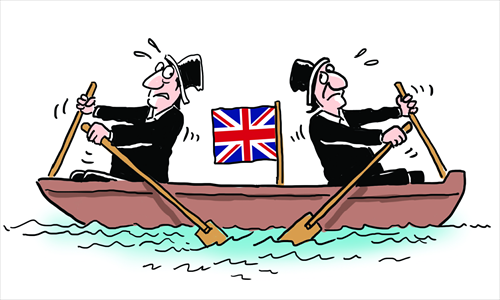Brexit vote exposes UK riven by inequality

Illustration: Liu Rui/GT
On June 24, 2016, the majority of British voters' decision to leave the European Union (Brexit) came as a shock to the rest of the world. Right before the referendum, Ipsos MORI, a political, social and business research company, conducted a final poll, predicting an eight-point win for Remain. This, coupled with the financial markets where stocks soared as investors bet that the UK would vote to remain, led people to believe that prudence and risk aversion among voters would eventually help Britain remain as a member of the EU.
However, the surprise comes more as a result of the unwarranted optimism from the experts' market prediction, than any abrupt shift in public opinion, which polled almost equally throughout the campaign. Although backed by almost unanimous support from economists, Remain received the backing of less than half of the UK's newspapers, while the highest circulation papers such as the Mail came out strongly for Leave.
The Leave camp is often accused of exploiting voters' sentiment with misinformation. Yet with the national turnout reaching 72.2 percent, the highest turnout at a UK-wide vote since 1992, it is simply irresponsible to discredit the cause of 17 million Eurosceptics who voted to leave the EU, and argue that they are all guilty of shortsightedness, xenophobia, insularity, or even ignorance. Such rhetoric reveals the same problematic mind-set of the political establishment that makes the working class in many developed countries feel alienated. With the social division rising as a result of the expanding income gap around the world, many experts, being the elite at the top of society, are more likely to have their judgment colored by their own limited worldviews and cognitive bias.
Just as the political pundits in the US failed to predict the surge of Donald Trump in the US primary election, the establishment in the UK also underestimated how strong a base the UK Independence Party, the leading force behind the Leave campaign, has.
The cost and benefit calculation of remaining in the EU is always centered on the overall economy. Yet what is often ignored is that the costs and benefits are distributed very unevenly among different regions.
The policy changes and deregulation brought by the EU membership in the past decades have disproportionately favored the wealthy in more populous and metropolitan regions, leaving those in the declining formerly industrial towns faced with the enormous challenges of an influx of immigrants who drive wages down and compete for limited public service, and a rising unemployment rate with businesses closing. A breakdown map that shows the prosperous vote for Remain strongly whereas economically depressed areas are more likely to vote for Leave reflects the vast disparities within the nation, even though these deprived areas also receive the most funding and aid from the EU itself.
Although there is little disagreement among economists and other experts that free trade, globalization, or the decision to remain in the EU would yield great benefits for the overall economy, hardly any attention is paid to the effect of these policies on those adversely affected.
Seeing little hope or pragmatic solutions offered by Westminster, the working class and lower middle class in the economically deprived regions can easily fall prey to populism and nativism. The referendum has only exacerbated this tension.
Leaving the EU may not solve their problems once and for all. The trend of globalization and industry off-shoring may also be hardly reversible. Yet for those Britons who have long held their identities as miners and steelworkers very dearly, but have been overwhelmed by a grim socio-economic perspective and few actions taken to address it, finding a scapegoat is perhaps the best they can get, and the only method they can resort to in order to cope with their boiling anger.
The author is a freelance journalist and a full-time student at HEC Paris. opinion@globaltimes.com.cn